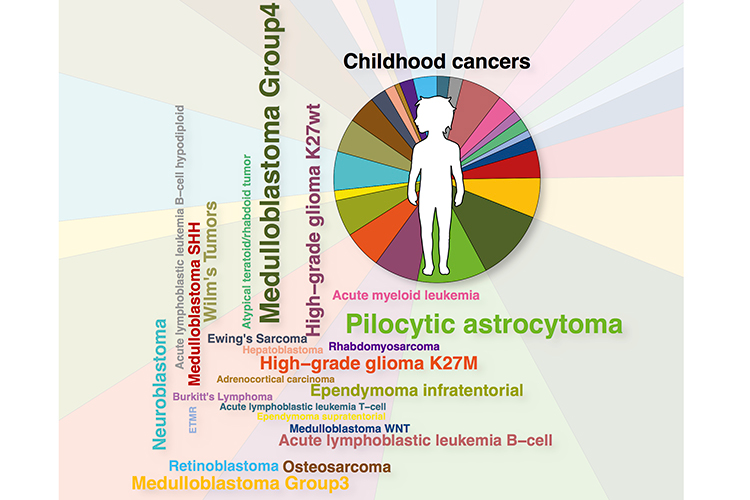
Pan-European registry study shows benefits of cancer genome sequencing for children with cancer

29-05-2020
n some cases, cancer genome analysis can help find a suitable therapy for children with relapsed cancer and delay the progression of the disease.
These are the findings of the INFORM registry study conducted by the Hopp Children´s Cancer Center Heidelberg (KiTZ), which systematically investigated the benefits of molecular precision oncology in children. The results of the pan-European project are being presented at the conference of the American Society of Clinical Oncology (ASCO), which is being held virtually from 29 to 31 May, and the project recently won the James B. Nachman endowed ASCO award.
The "Hopp Children´s Cancer Center Heidelberg" (KiTZ) is a joint institution of the German Cancer Research Center (DKFZ), Heidelberg University Hospital (UKHD) and Heidelberg University.
The "Hopp Children´s Cancer Center Heidelberg" (KiTZ) is a joint institution of the German Cancer Research Center (DKFZ), Heidelberg University Hospital (UKHD) and Heidelberg University.
In many cases, when cancer comes back in children, there are hardly any treatment options left. The aim of the INFORM study is for children with relapsed malignancies to receive more effective therapies once the standard treatments have been exhausted. "When it comes to precision medicine and the development of new therapies, pediatric oncology lags behind cancer treatment for adults, where there are lots of clinical studies, lots of new biomarkers and lots of new drugs," says pediatric oncologist and KiTZ researcher Cornelis van Tilburg, who presented the new findings at the ASCO conference.
The INFORM study (INdividualized Therapy FOr Relapsed Malignancies in Childhood) was launched in 2015 to identify molecular targets in children with relapsed cancer that could unlock new treatment options. Together with physicians from University Hospital Heidelberg (UKHD) and researchers from the German Cancer Research Center (DKFZ), the KiTZ team developed an algorithm that they used to assign molecular changes in a tumor to one of seven categories, from ´very suitable´ to ´unsuitable´, depending on their suitability as a therapeutic target structure. For example, genetic changes in the tumor were classed as very suitable if they are very specific to certain forms of cancer that are known to activate biological target structures that can be directly targeted with active pharmaceutical substances and for which drugs have already been approved, or for which clinical trials are already underway.
The attending pediatric oncologists at the 72 centers in eight European countries were then able to use this information to inform their therapy choices. A total of 149 young patients with relapsed cancer received a more targeted treatment based on the INFORM results, for example through inclusion in a clinical trial or through an ´off-label´ treatment using a drug that was originally approved for adults. Of these, 20 patients had a ´very suitable´ target structure and the progression of the cancer was delayed by three months compared with patients with less suitable target structures. In all, 525 patients were included in the analysis. In eight per cent of brain tumor patients, it was also possible to diagnose the precise tumor form based on the genome analysis.
"The results show that it is possible to identify molecular targets that open up new treatment possibilities for children with relapsed cancer and a very poor prognosis, and make precision oncology possible for children in the first place," says David Jones, coordinator of molecular diagnostics for the INFORM project at KiTZ. Moreover, the results have already led to the launch of several clinical trials to test new biomarkers for cancer in children. The INFORM approach was recently awarded the James B. Nachman endowed award for pediatric oncology by the American Society of Clinical Oncology (ASCO).
The KiTZ researchers aim to open up individual tumor analyses for as many children as possible, thereby offering them a chance of a potentially more effective therapy, for instance within innovative clinical trials. "There are hardly any innovative targeted drugs specifically for children," says KiTZ director Olaf Witt, who is the coordinator of the INFORM registry study and head of the DKFZ´s clinical cooperation unit for pediatric oncology, and also works as a pediatric oncologist at University Hospital Heidelberg. "There are very few clinical trials running in Germany to test new treatment approaches specifically for children with cancer," he adds. "Our vision for the future is to find a customized therapy for every type of tumor in children."
The KiTZ researchers aim to open up individual tumor analyses for as many children as possible, thereby offering them a chance of a potentially more effective therapy, for instance within innovative clinical trials. "There are hardly any innovative targeted drugs specifically for children," says KiTZ director Olaf Witt, who is the coordinator of the INFORM registry study and head of the DKFZ´s clinical cooperation unit for pediatric oncology, and also works as a pediatric oncologist at University Hospital Heidelberg. "There are very few clinical trials running in Germany to test new treatment approaches specifically for children with cancer," he adds. "Our vision for the future is to find a customized therapy for every type of tumor in children."
































No hay comentarios:
Publicar un comentario